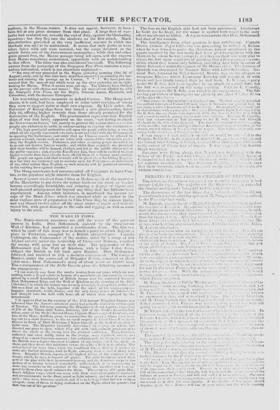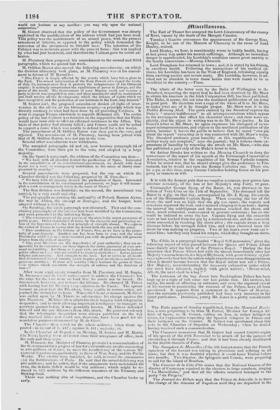DEBATES IN THE FR ENt'll. CH A.:' , 11fEll or DEPUTIES.
The debate on the address was S..Inr.itty 7■1:er it bad occupied Woe., The inejority for 11:y •Miliii.'y iy exceeded
the rounhee ; being 241 to 1 raj:.
The (11,2 0: the last three dey... .• ,1151 ,ion. did not
v.:e noticed
possess- fotert-st„ ai ter tile spcceit.t)1 ecette.s is the PI 0.eript la ••'. week. 3i, Jaitle.irt,
the con lurt Ea duet of the !.reseat French would deve ive ne ; they tleati for exteti:
from Alex": 5vaieli ni...ters, who 1, 1:'.ins
ohs, ;hex do yteti is now %viutt use v.
give to de any thing wi;:i it.
for it if it 55.5 re C..: .
hat. n tAkra.
I mat ;Ira.; C.; . .fi,t. ..t ClO 1 I
••.• Y •o hsirs. 1 that lie haii • mid h.trstnntli .
' 11.:•1
en tie Aslt cel the e..1•1.,s•• ealefa.
Cm. it..
71d 17,,I
t woe':
::11."1.0
eiy against the con- . -, he said, :traction it fleet :ete
Mi- .11.1e.:7, ,111 Lot
Tcturn :. chat you ice lot) iound en a
e ie__iota
es of in- :le mid yet ..I him and . •--e written
i.stilt welt till
..e. In el the the
..1,0.1 to
...ifs..ay even- ott, ;iced.
u'io limn- '. the motion
suit jiist place tt.ic,cats we end c ee of the she owes not less ehould country nice. •,•
for war 1.y IL' r d to motive for c I,• • ion. tVitli the
iwords_ Pree. 1, :t sm.1 bodied Mt,' le, tie. Truer in the !hot. '1 11:e W .
would not hesitate at any sacrifice : you may rely upon the national cooperation."
M. Guizot observed that the policy of the Government was clearly explained in the modifications of the address which had just been read. This poliefwas the maintenance of an armed peace, with the present armament of 500,000, as opposed to the policy which demanded the extension of the armaments to 900,000 men. The intention of the Cabinet was to maintain peace with the present force: this was implied by what had just been read, and therefore the Cabinet gave its entire ad- hesion.
M. Piscatory then proposed his amendments to the second and third paragraphs, which we quoted last week.
M. ()chiffon Barrot also moved the following amendments; on which the division ultimately took place, as M. Piscatory waved his amend- ment iu favour of 31 Barrot's-
" Sire, Eranse is deeply affected by the events which have taken place in the East. The armed intervention of the Four Powers %vim signed the treaty of July 15, menaces more than it protects the independence of the Ottoman empire ; it seriously compromises the equilibrium of power in Europe, and the peace of the world. The Government of your Majesty could not become a party to it—it was compelled to aria; and these armaments shall be maintained, and shall receive all the developments which the defence of rights which we have recognized, and the protection of our interests in the East, may demand."
M. Guizot said, the proposed amendment denied ell right of inter- vention in the affoirs of the Ottoman empire,—a principle which was directly contrary to what had been done by all preceding Cabinets. It went to engage France absolutely to support Mehemet Ali. The entire policy of the last Cabinet was founded on the supposition that the Pasha would have been able to offer an effectual resistance to the Allies. The basis of that policy had already failed ; and France could not be called to support a cause which was unable to defend itself for a few weeks.
The amendment of M. Odillon Barrot was then put to the vote, and rejected. The amendment of 31. Piscatory, having becu joined with that of M. Odillon Barrot, was not put to the vote.
Several other amendments were withdrawn.
The anew ded paragraphs 2d and ad, now become paragraph 2d of the Committee, were then put to the vote, and adopted by a large majority.
On the Spanish paragraph, the address of the Committee ran thus-
" We have with all sincerity desired the pacification of Spain. Interested in the cotsoliti+tioti of its constitutional government, we should with deep regret see a wort. so courageously undertaken in the name of liberty com- promised by anarchy."
Several amendments were proposed, but the one on which the Chamber divided was the following, proposed by AL Pasealis-
" We have with all sincerity desired the pacification of Spain. Interested in the consolidation of its constitutional government, we hope it will accom- plish a work so courageously taken in the name of liberty."
The first division was doubtful ; on the second, the amendment was carried, by a very small majority. The parsgraphs cmicerning the nationality of Poland, Buenos Ayres, the war in Africa, the attempt at Boulog,ue, and the budget, were adopted without a division.
On Saturday, the ninth paragraph was discussed. That and the con- chiding paragraphs of the adaress had been modified by the Committee, and were presented in the following form-
" The concurrence of the great powers of the state is the surest guarantee of public Twace. Order maintained at home by the energetic and persevering ac- tion of the Gots:mu:est is the first principle of strength abroad. We express the wishes of France in saving that she desires both the one and the other.
" have confidence in the fortune of France, Sire, as we have in the perpe- tuity of your dynasty. Another son has been born to you; and the same Providence which hits onee more favoured you with its protection will reserve France from the evils of anarchy. " Sire, your .Ministers are the depositories of your authority ; they are re- sponsible tbr its execution ; on them depends the entire guarantee of your per- sonal. inviolability. Let them, as is your wish, lice all their exertions to bestow public offices on ho are entitled to them hy merit alone. Let its honour religion and morality. Add strength to the laws. Let its revive in all hearts that disinterested loic of country which inspires great devotedness and diehtes generous sacrifices. llonour and country—these harbour the germs of those civic virtues which consaittac the strength of nations and the duration of states."
After some expldualory remarks from M. Piscatory and M. Dupin, M. Desmousseaux de emier6 endeavoured to address the Chamber ; but the cries for the vote were so loud that he could not be hear& He determined, however, net to leave the tribune. lie charged M. Timbers with having lent his alinistry to speculations in the Funds. The uproar became so great grit the President, being it table to restore order, ad- journed the sitting for ;to hour. When the C:ilanther resumed, M. Ghia: was called upon by M. 'fliers to substantiate his charge against the late Ministers. M. Givre then alluded to their keeping, back telegraphic despatches, and to their allowing important intelligence to transpire in a certain quarter before it was generally known. M. 'faders defended himself and the late Ministers from this attack. Ile protested solonly that the telegraphic despatches were always published on the clay they reached lilt ; amid could not, therefore, have been aged for the scandalous purposes denounced by M. de theta'.
The Chamber then voted on the whole address ; when there ap- peared—in favour of it, 247 ; against it, 161; majority, 86.
In the Chamber of Deputies on Monday, M. Guizot and M. Martin (du Nord) having been realected since their acceptance of office, took the oath and their seats.
M. Ilittnatin, the Minister of Finance, presented a communication of the Gdvernment for a project of law for extraordinary credits amounting to 240 millions of famines, to meet the insufficiency of the various 31i- nisterial departineets, particularly in those of War, Navy, and the Public Works. The credits were intended, he said, to cover the armaments sad the fortifications of Paris. Ile said that the actual deficiency was 280 millions; and he added, that it' the armaments were maintained till 1842, the definite deficit would he 8:32 ; which might be re- duced to 675 millions by the different resources of the Treasury and Sinking-fund.
There was nothing else of importance, and the Chamber broke up early.



























 Previous page
Previous page